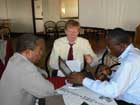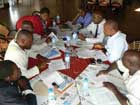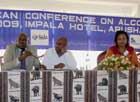Conference on the prevention of alcohol-related harm in East Africa
Arusha, Tanzania: East African conference with a strong appeal for evidence-based alcohol policies in the region.
More than 80 participants from five East African countries - Tanzania, Uganda, Kenya, Rwanda and Burundi – met in Arusha, Tanzania in mid-January to find an appropriate policy response to alcohol-related problems in the region. The picture to the left portrays three of the participants; (from left) Roger Kasirye from Uganda, Moses Waweru and Jennifer Kimani from Kenya.
The conference was concluded with a set of recommendations that were presented to the Director General of Customs of the East Africa Community, Mr. Peter Kiguta. The recommendations are based on the fact that “by current estimates alcohol is among the most significant risk factors for death and disability in Sub-Saharan Africa. In some countries (e.g., Uganda, Burundi, Zimbabwe), per capita consumption is among the highest in the world. Although most of the African population (55%) chooses not to drink alcoholic beverages, heavy episodic drinking is typical among those who do drink.”
After two days of discussions, and also presentations by invited experts from Nigeria, Sri Lanka, USA and Sweden, the participants of the conference recommended that a set of selected measures be implemented expeditiously in order to build a comprehensive system of legal regulatory, educational and treatment measures to deal with alcohol -related problems from a public health perspective. Among the recommended measures from the Arusha conference were reducing the number and density of alcohol outlets, locations, days and hours of opening; price and tax measures that increase the relative cost of alcoholic beverages; strict enforcement of laws restricting the sale of alcohol to minors under the age set by domestic legal statutes; banning all forms of alcohol advertising, promotion and sponsorship that promote alcoholic products by any means that are false, misleading or deceptive or likely to create erroneous impression about its characteristics, health effects or hazards.
 The WHO sponsored study Alcohol No Ordinary Commodity was an important part of the knowledge base for the conference, and the essence of the study was presented by the editor, Professor Thomas Babor from the University of Connecticut in the US. In the picture to the right Professor Babor is in discussions with Ali Mzige (left) and Isodor Obot (right).
The WHO sponsored study Alcohol No Ordinary Commodity was an important part of the knowledge base for the conference, and the essence of the study was presented by the editor, Professor Thomas Babor from the University of Connecticut in the US. In the picture to the right Professor Babor is in discussions with Ali Mzige (left) and Isodor Obot (right).
During the discussions attention was also paid to the problems related to home- produced and unrecorded alcohol, which in this region of the world may count for as much as half of the total consumption of alcohol. There is an urgent need of more research on the issue of illicit alcohol. Independent from that, addressing this consumption should be integral part of a comprehensive approach to alcohol policy, but more general community development measures are also needed, as many poor families earn their income by women’s brewing of local alcohol.
The conference, which was organized by the Swedish IOGT-NTO Movement, together with NGOs and governments in the region, also appealed to the World Health Organization to provide technical support to countries interested in improving their national alcohol policies. On the other hand the conference warned against letting vested interests influence national alcohol policy processes in ways that compromise the public health. This recommendation was given on the background that the multinational drinks industry has tried to take over the steering-wheel in national policy processes in 7-8 countries in Sub-Saharan countries. Some of these cases were presented and discussed at the Arusha conference, in order to exchange experiences on how health policies of the region can be protected from undue influence by economic operators.
 Picture to the left: Participants from Uganda discussing their national alcohol policy situation. (All photos taken by Per-Åke Andersson)
Picture to the left: Participants from Uganda discussing their national alcohol policy situation. (All photos taken by Per-Åke Andersson)

